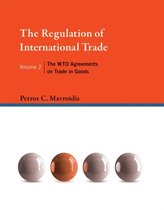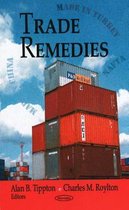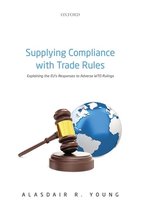Regulating Unfair Trade
Afbeeldingen
Sla de afbeeldingen overArtikel vergelijken
Auteur:
Pietro S. Nivola
- Engels
- Paperback
- 9780815760894
- 01 januari 1993
- 210 pagina's
Samenvatting
In the early 1980s, American complaints about unfair trade practices began to intensify. Sunrise industries, such as manufacturers of semiconductors and telecommunications equipment, joined older complainants, including steel and textile producers, in seeking more safeguards against international competitors who priced their products too aggressively or whose governments subsidized exports or protected home markets. In this politically charged atmosphere, the U.S. government has devised increasingly stringent regulatory programs to address the claimed abuses and distortions. In this book, Pietro Nivola examines the strenuous effort to combat the objectionable trading practices of other countries. Through most of the postwar period, Nivola notes, policymakers had deemed it in the nation's economic and strategic interests to tolerate asymmetries and infractions in the international trading order. But that tolerance has been sharply lowered by heightened sensitivity to inequities, and a growing conviction that government should intervene, frequently and forcefully, to ensure a level playing field. The book maintains that foreign protectionism lower East-West tensions, and alleged American decline in the face of international competition cannot fully explain the stiffening regulation of unfair trade. The world trading system, Nivola contends, is not more restrictive now than it was earlier. Cries about foreign commercial transgressions in recent years have remained shrill despite a formidable U.S. export boom and an improved current account valance. Much of the U.S. regulatory activity has acquired a political momentum of its own. The activity has increased not just because global competitive pressures have generally intensified but because we have developed more ways and inducement to complain about those pressures. Nivola cautions that trade regulations now bears too much of the burden for ameliorating economic imbalances and deficiencies. The tendency adds to a sense of frustration that fuels demands for additional regulations. While recognizing the need for an explicit and responsible trade policy, Nivola concludes that such a policy must be based, first and foremost, on realistic expectations. Trade actions need to compliment, not subordinate, a more basic agenda: improvement in the national rates of saving and investment, better preparation of the work force, control of runaway health care costs, less litigation, and more regulatory reform-all of which are likely to be far more consequential for the nation's long-term competitiveness and living standards.
Productspecificaties
Wij vonden geen specificaties voor jouw zoekopdracht '{SEARCH}'.
Inhoud
- Taal
- en
- Bindwijze
- Paperback
- Oorspronkelijke releasedatum
- 01 januari 1993
- Aantal pagina's
- 210
- Illustraties
- Nee
Betrokkenen
- Hoofdauteur
- Pietro S. Nivola
- Hoofduitgeverij
- Brookings Institution
Overige kenmerken
- Extra groot lettertype
- Nee
- Product breedte
- 152 mm
- Product lengte
- 229 mm
- Studieboek
- Nee
- Verpakking breedte
- 152 mm
- Verpakking hoogte
- 229 mm
- Verpakking lengte
- 229 mm
- Verpakkingsgewicht
- 288 g
EAN
- EAN
- 9780815760894
Je vindt dit artikel in
- Categorieën
- Taal
- Engels
- Beschikbaarheid
- Leverbaar
- Boek, ebook of luisterboek?
- Boek
- Studieboek of algemeen
- Algemene boeken
Kies gewenste uitvoering
Bindwijze
: Paperback
Prijsinformatie en bestellen
De prijs van dit product is 14 euro en 95 cent. De meest getoonde prijs is 24 euro en 99 cent. Je bespaart 40%. Dit is een tweedehands product.
Je bespaart 40%
Alleen tweedehands
Goed
Washington, D.C : Brookings Institution, c1993. Paperback. xviii,190 pp.
Washington, D.C : Brookings Institution, c1993. Paperback. xviii,190 pp.
1 - 2 weken
Verkoop door
Boekhandel de Kloof Amsterdam
- Bestellen en betalen via bol
- 30 dagen bedenktijd en gratis retourneren
Rapporteer dit artikel
Je wilt melding doen van illegale inhoud over dit artikel:
- Ik wil melding doen als klant
- Ik wil melding doen als autoriteit of trusted flagger
- Ik wil melding doen als partner
- Ik wil melding doen als merkhouder
Geen klant, autoriteit, trusted flagger, merkhouder of partner? Gebruik dan onderstaande link om melding te doen.








